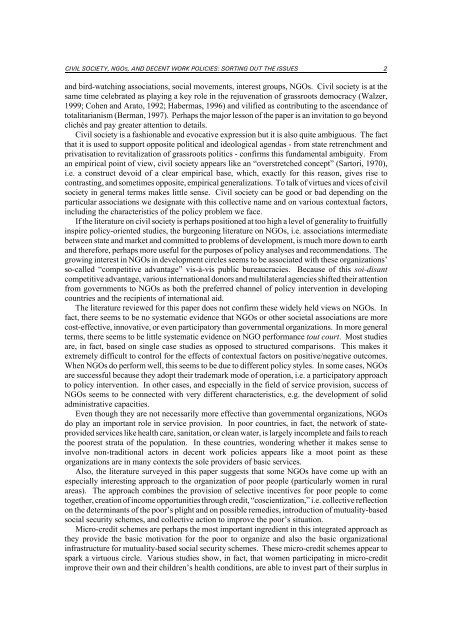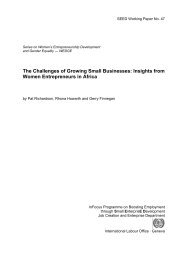Civil Society, NGOs, and Decent Work Policies: Sorting out the Issues
Civil Society, NGOs, and Decent Work Policies: Sorting out the Issues
Civil Society, NGOs, and Decent Work Policies: Sorting out the Issues
You also want an ePaper? Increase the reach of your titles
YUMPU automatically turns print PDFs into web optimized ePapers that Google loves.
CIVIL SOCIETY, NGOS, AND DECENT WORK POLICIES: SORTING OUT THE ISSUES 2<br />
<strong>and</strong> bird-watching associations, social movements, interest groups, <strong>NGOs</strong>. <strong>Civil</strong> society is at <strong>the</strong><br />
same time celebrated as playing a key role in <strong>the</strong> rejuvenation of grassroots democracy (Walzer,<br />
1999; Cohen <strong>and</strong> Arato, 1992; Habermas, 1996) <strong>and</strong> vilified as contributing to <strong>the</strong> ascendance of<br />
totalitarianism (Berman, 1997). Perhaps <strong>the</strong> major lesson of <strong>the</strong> paper is an invitation to go beyond<br />
clichés <strong>and</strong> pay greater attention to details.<br />
<strong>Civil</strong> society is a fashionable <strong>and</strong> evocative expression but it is also quite ambiguous. The fact<br />
that it is used to support opposite political <strong>and</strong> ideological agendas - from state retrenchment <strong>and</strong><br />
privatisation to revitalization of grassroots politics - confirms this fundamental ambiguity. From<br />
an empirical point of view, civil society appears like an “overstretched concept” (Sartori, 1970),<br />
i.e. a construct devoid of a clear empirical base, which, exactly for this reason, gives rise to<br />
contrasting, <strong>and</strong> sometimes opposite, empirical generalizations. To talk of virtues <strong>and</strong> vices of civil<br />
society in general terms makes little sense. <strong>Civil</strong> society can be good or bad depending on <strong>the</strong><br />
particular associations we designate with this collective name <strong>and</strong> on various contextual factors,<br />
including <strong>the</strong> characteristics of <strong>the</strong> policy problem we face.<br />
If <strong>the</strong> literature on civil society is perhaps positioned at too high a level of generality to fruitfully<br />
inspire policy-oriented studies, <strong>the</strong> burgeoning literature on <strong>NGOs</strong>, i.e. associations intermediate<br />
between state <strong>and</strong> market <strong>and</strong> committed to problems of development, is much more down to earth<br />
<strong>and</strong> <strong>the</strong>refore, perhaps more useful for <strong>the</strong> purposes of policy analyses <strong>and</strong> recommendations. The<br />
growing interest in <strong>NGOs</strong> in development circles seems to be associated with <strong>the</strong>se organizations’<br />
so-called “competitive advantage” vis-à-vis public bureaucracies. Because of this soi-disant<br />
competitive advantage, various international donors <strong>and</strong> multilateral agencies shifted <strong>the</strong>ir attention<br />
from governments to <strong>NGOs</strong> as both <strong>the</strong> preferred channel of policy intervention in developing<br />
countries <strong>and</strong> <strong>the</strong> recipients of international aid.<br />
The literature reviewed for this paper does not confirm <strong>the</strong>se widely held views on <strong>NGOs</strong>. In<br />
fact, <strong>the</strong>re seems to be no systematic evidence that <strong>NGOs</strong> or o<strong>the</strong>r societal associations are more<br />
cost-effective, innovative, or even participatory than governmental organizations. In more general<br />
terms, <strong>the</strong>re seems to be little systematic evidence on NGO performance t<strong>out</strong> court. Most studies<br />
are, in fact, based on single case studies as opposed to structured comparisons. This makes it<br />
extremely difficult to control for <strong>the</strong> effects of contextual factors on positive/negative <strong>out</strong>comes.<br />
When <strong>NGOs</strong> do perform well, this seems to be due to different policy styles. In some cases, <strong>NGOs</strong><br />
are successful because <strong>the</strong>y adopt <strong>the</strong>ir trademark mode of operation, i.e. a participatory approach<br />
to policy intervention. In o<strong>the</strong>r cases, <strong>and</strong> especially in <strong>the</strong> field of service provision, success of<br />
<strong>NGOs</strong> seems to be connected with very different characteristics, e.g. <strong>the</strong> development of solid<br />
administrative capacities.<br />
Even though <strong>the</strong>y are not necessarily more effective than governmental organizations, <strong>NGOs</strong><br />
do play an important role in service provision. In poor countries, in fact, <strong>the</strong> network of stateprovided<br />
services like health care, sanitation, or clean water, is largely incomplete <strong>and</strong> fails to reach<br />
<strong>the</strong> poorest strata of <strong>the</strong> population. In <strong>the</strong>se countries, wondering whe<strong>the</strong>r it makes sense to<br />
involve non-traditional actors in decent work policies appears like a moot point as <strong>the</strong>se<br />
organizations are in many contexts <strong>the</strong> sole providers of basic services.<br />
Also, <strong>the</strong> literature surveyed in this paper suggests that some <strong>NGOs</strong> have come up with an<br />
especially interesting approach to <strong>the</strong> organization of poor people (particularly women in rural<br />
areas). The approach combines <strong>the</strong> provision of selective incentives for poor people to come<br />
toge<strong>the</strong>r, creation of income opportunities through credit, “coscientization,” i.e. collective reflection<br />
on <strong>the</strong> determinants of <strong>the</strong> poor’s plight <strong>and</strong> on possible remedies, introduction of mutuality-based<br />
social security schemes, <strong>and</strong> collective action to improve <strong>the</strong> poor’s situation.<br />
Micro-credit schemes are perhaps <strong>the</strong> most important ingredient in this integrated approach as<br />
<strong>the</strong>y provide <strong>the</strong> basic motivation for <strong>the</strong> poor to organize <strong>and</strong> also <strong>the</strong> basic organizational<br />
infrastructure for mutuality-based social security schemes. These micro-credit schemes appear to<br />
spark a virtuous circle. Various studies show, in fact, that women participating in micro-credit<br />
improve <strong>the</strong>ir own <strong>and</strong> <strong>the</strong>ir children’s health conditions, are able to invest part of <strong>the</strong>ir surplus in
















